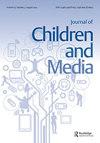Filters and fillers: Belgian adolescents’ filter use on social media and the acceptance of cosmetic surgery
IF 2.1
3区 心理学
Q2 COMMUNICATION
引用次数: 5
Abstract
ABSTRACT This study examined whether adolescents’ use of (a) body and (b) face filters was related to acceptance of cosmetic surgery (ACS) (i.e. intrapersonal and social acceptance, and intention). Attention was paid to possible differences according to adolescents’ (1) sex, (2) self-esteem, and (3) pubertal timing. A cross-sectional online survey among 333 Flemish adolescents (Mage = 16.06, SD = 1.45) with 71.2% girls was used to test the hypothesized model via structural equation modeling. The use of face filters was positively linked to social motivations of ACS and consideration of cosmetic surgery. Body filter use was only linked to social motivations of ACS. Only girls showed a link between body filter use and social ACS. The findings underline the role of filter use in adolescents’ ACS. Impact Summary Prior State of Knowledge: Research has shown that the use of social media filters increases individuals’ acceptance of cosmetic surgery (ACS). Yet, most research has focused on adults when investigating these relations. Little is known about how adolescents’ filter usage is linked to ACS. Novel Contributions: Our results underline the importance of looking at gender differences, distinguishing between different types of social media filters (i.e. face vs. body filters), and approaching ACS as a multidimensional construct by taking into account different reasons to consider cosmetic surgery. Practical Implications: Filter use played an important role in adolescents’ ACS, particularly in their perceptions on social benefits of cosmetic surgery. Practitioners developing intervention programs are advised to focus on enhancing adolescents’ cognitive skills to put especially these social benefits into perspective.滤镜和填充物:比利时青少年在社交媒体上使用滤镜和接受整容手术
摘要本研究调查了青少年使用(a)身体和(b)面部滤镜是否与接受整容手术(ACS)有关(即个人和社会的接受程度以及意图)。关注根据青少年(1)性别、(2)自尊和(3)青春期时间的可能差异。一项针对333名佛兰德青少年(Mage=16.06,SD=1.45)的横断面在线调查,其中71.2%为女孩,通过结构方程模型对假设模型进行了测试。面部滤镜的使用与ACS的社会动机和考虑整容手术呈正相关。身体过滤器的使用仅与ACS的社会动机有关。只有女孩显示出使用身体过滤器和社交ACS之间的联系。研究结果强调了过滤器在青少年急性冠脉综合征中的作用。影响总结先前的知识状态:研究表明,社交媒体过滤器的使用增加了个人对整容手术(ACS)的接受度。然而,在调查这些关系时,大多数研究都集中在成年人身上。关于青少年使用滤镜与ACS的关系,我们知之甚少。新颖的贡献:我们的研究结果强调了关注性别差异、区分不同类型的社交媒体滤镜(即面部滤镜和身体滤镜)以及将ACS视为一个多维结构的重要性,考虑到考虑整容手术的不同原因。实际意义:滤镜的使用在青少年ACS中发挥了重要作用,特别是在他们对整容手术的社会效益的看法中。建议制定干预计划的从业者专注于提高青少年的认知技能,特别是要正确看待这些社会效益。
本文章由计算机程序翻译,如有差异,请以英文原文为准。
求助全文
约1分钟内获得全文
求助全文

 求助内容:
求助内容: 应助结果提醒方式:
应助结果提醒方式:


